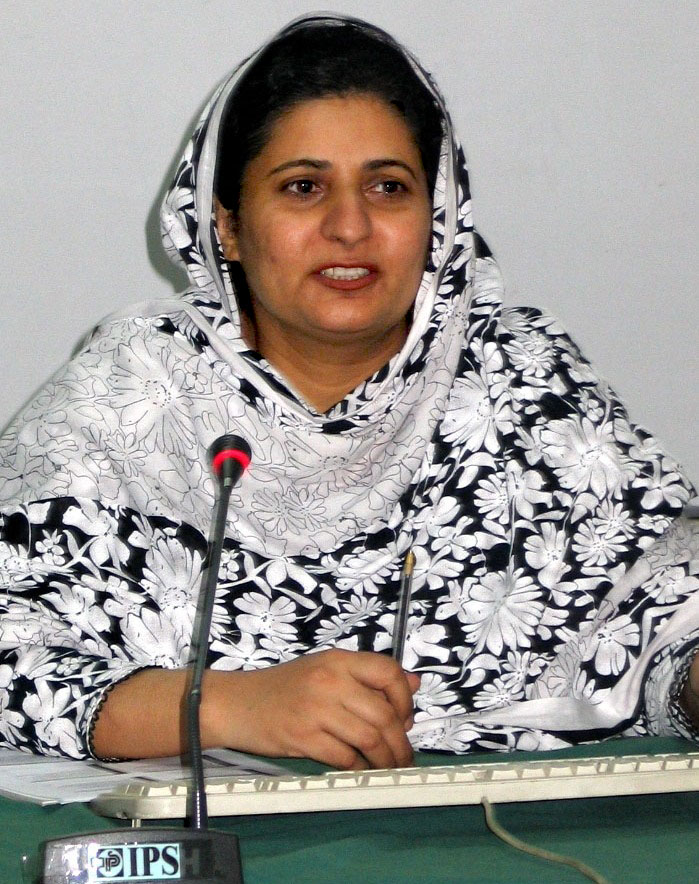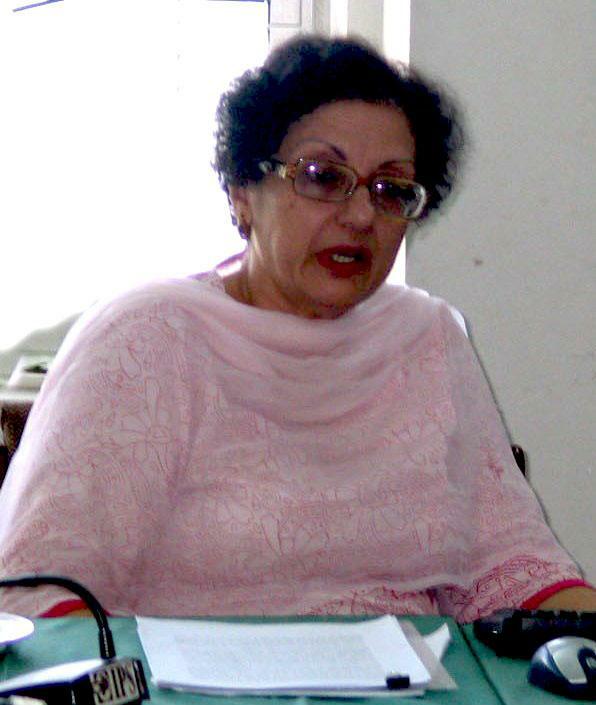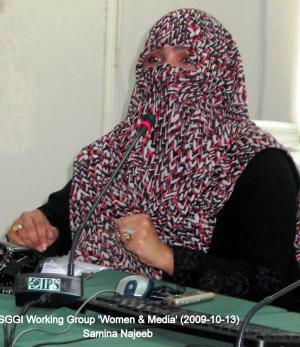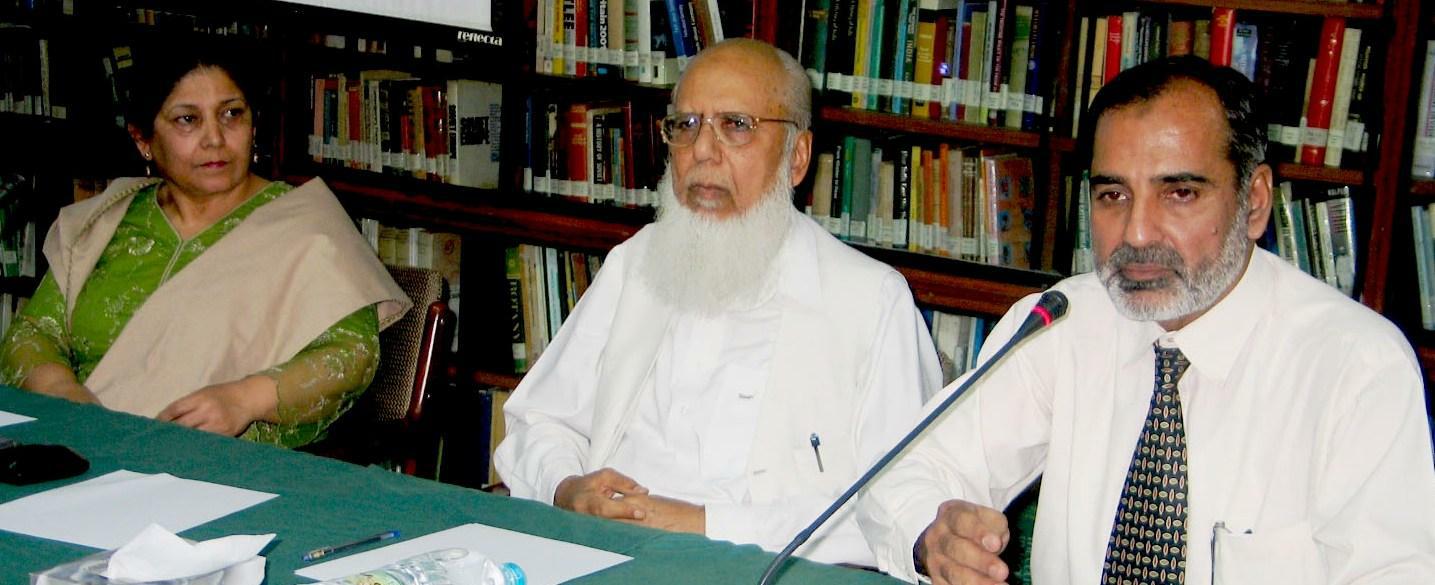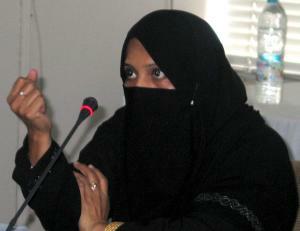Economic Empowerment of Women and its Impact on Family Structure
Third meeting of the SGGI – Working Group on ‘Women & Economy’ was held, with Mr. Khalid Rahman in the chair. Ms. Mamonah Ambreen, Lecturer in Department of Women and Gender Studies, AIOU, gave presentation on “Economic Empowerment of Women and its Impact on Family Structure”.
SGGI Working Group on ‘Women & Economy’ holds its 3rd Roundtable
Third meeting of the SGGI – Working Group on ‘Women & Economy’ was held, with Mr. Khalid Rahman in the chair. Ms. Mamonah Ambreen, Lecturer in Department of Women and Gender Studies, AIOU, gave presentation on “Economic Empowerment of Women and its Impact on Family Structure”.
The presentation was based on a qualitative empirical research of a village named Dasuha, situated at a distance of 10 km from metropolitan city Faisalabad, in the province of Punjab. In Dasuha village, majority of women are economically empowered; therefore, this place was ideal for a case study on this subject. Ms. Ambreen stayed in the village for six months, carrying out interviews and analyzing the social structure as well as trends and behavior of people applying different research tools and methodologies. The main focus of the research was to study how the economically empowered women maintain balance between their household responsibilities and job. It also analysed how women’s economic independence affects in shaping, strengthening, and sharpening their attitude and behavior.
Ms. Mamonah Ambreen underscored that the role of women in society is expanding from the traditional sphere of household to the active engagement in all spheres of public life. This extension in their roles is redefining the concepts and reshaping the practices. While the family institution is faced with a challenge, women too have to struggle hard to adjust to their newly acquired roles along with concentrating duly on their family life and responsibilities. She stressed that it is about time to understand the phenomenon and to formulate a proper framework for women’s participation in national life through in-depth analysis of the situation.
Explaining her research methodology, Ms. Ambreen said that during her six month stay in the village, she did not rely entirely on questionnaires and interviews; rather, she observed the routine life through participation in local functions, traditions and day-to-day affairs. Aged and respected persons were identified as key informants and information received through field work was counter checked from them. They also helped to understand different phases through which the local society had passed during recent past.
Dasuha village is a well populated area where women are commonly engaged in variety of economic activities. People are well educated and doctors and CSP officers hail from and live in this village. Most women are employed as teachers, while others are engaged in nursing and other respectable jobs in the city. Some women are also involved in agriculture, poultry and handicraft businesses. Even those staying at home remain busy in activities like handicraft and stitching, but no woman has yet found running her own business independently. It is important to note that high school in this village was established about hundred years back during British era.
Muslims make majority of the population in the village. Most women observe veil and offer their prayers regularly. Christians also make a part of the community.
Before sharing findings of her research, she elaborated the concepts involved in the study. She said that she had taken the term ‘status of women’ to mean position of women as individuals in the social structure defined by their designated rights and obligations. She took economy to mean all those activities which generate income or cause saving. She viewed that women are contributing to ‘household economy’ either directly (generating income) or indirectly (causing savings).
 She narrated her observation that economically empowered women want relatively more share in decision making and other household affairs. There are instances where woman refuses to shift to the home of her husband after marriage and insists that either he should move to stay with her at her place or opt for dissolution of marriage. This insistence of women has led to major change in the local social structure and the village is now commonly referred to as “Jawaiyan da Pind” (village of sons-in-law).
She narrated her observation that economically empowered women want relatively more share in decision making and other household affairs. There are instances where woman refuses to shift to the home of her husband after marriage and insists that either he should move to stay with her at her place or opt for dissolution of marriage. This insistence of women has led to major change in the local social structure and the village is now commonly referred to as “Jawaiyan da Pind” (village of sons-in-law).
As another consequence of this change, sons cannot normally keep their parents with them to take care of them in older age; rather, women keep their own parents along. They, however, do not normally seek guidance from or allow interference of parents and other elders in decision making.
Percentage of maladjustments within the families of working ladies of the village is much higher than that of the non-working. Previously, people used to live in the form of joint families; but now, joint families are increasingly breaking into nuclear families.
Another significant development that has recently been noticed is that some parents, mindful of the fact that they may have to rely on their daughters instead of sons in their later days, have allocated an unusually higher share of their assets to their daughters.
Though women are engaged in earning, yet their share in the household economy is negligible. Rarely a woman, who earns through job, pools her income into household economy for running day-to-day expenditures. Men are still considered responsible for maintaining the family. Also domestic chores have to be managed by females either personally or through servant, arranged and paid by them. Children are either looked after by the grand parents or servants. Men have to sacrifice and suffer, and strains are often observed within families. Divorce rate in the village is higher than normal in the adjoining areas.
Despite these troubles within families, no case of domestic violence is noted. Presenter viewed it as result of maturity, brought in by education.
 Women, who do not go out for earning too make their contributions to the household economy as they remain engaged in income generating as well as saving activities, while giving full attention to the family and the household. Since a working woman has to maintain herself in accordance with her social and official engagements and pay the servants hired by them for household chores, the net contribution of working women to the home stands almost at the same level as that of a house-wife.
Women, who do not go out for earning too make their contributions to the household economy as they remain engaged in income generating as well as saving activities, while giving full attention to the family and the household. Since a working woman has to maintain herself in accordance with her social and official engagements and pay the servants hired by them for household chores, the net contribution of working women to the home stands almost at the same level as that of a house-wife.
Women normally are tempted to work to bring into effect the education that they have acquired. Job is generally considered as ultimate end of education. There are, however, women in the same village who are though well qualified, yet do not opt for job as they prefer to attend to their children and other family members while their husbands and other male members of family earn the living.
Though economically empowered women insist on having a greater say in decision making than household women, factually, they find less time to put in their family lives. A house-wife, on the other hand, seems more empowered in this respect.
Discussing the role of women, Ms. Ambreen also shared with the members that successive studies undertaken by departments of anthropology have consistently shown that men and women in Pakistani society consider such a woman as ideal, who maintains and strengthens the family institution through her household contribution. Though acceptance for participation of women in outdoor economic activity is being enhanced, yet women’s traditional role is still valued.
In the discussion that followed, all members appreciated the presentation and it was observed that the research conducted by the presenter is a good depiction of social and cultural scenario. This empirical research, therefore, gives an insight into the possible scenario that is being built up through policies of women’s economic empowerment.
 It was highlighted that ideal women and empowerment should be defined with regard to Pakistani society. Economic empowerment of women is generally considered just emancipation from economic and social restrictions and independence in decision making; however, this concept does not conform to the construct of every society and its local values and traditions. In a Pakistani society, in most of the cases, eldest member of the society is most respected and thus empowered, despite the fact that he/she does not contribute a penny to the household income. So, empowerment in Pakistani society is not necessarily attached with financial position of a person.
It was highlighted that ideal women and empowerment should be defined with regard to Pakistani society. Economic empowerment of women is generally considered just emancipation from economic and social restrictions and independence in decision making; however, this concept does not conform to the construct of every society and its local values and traditions. In a Pakistani society, in most of the cases, eldest member of the society is most respected and thus empowered, despite the fact that he/she does not contribute a penny to the household income. So, empowerment in Pakistani society is not necessarily attached with financial position of a person.
According to the teachings of Islam, a woman has sole right over her property and income; however, as social relations are strengthened by courtesy, sacrifice and care, a woman, who earns, should contribute to household economy; similarly, the males should not refrain from lending help in household chores. This is the better means of earning respect and strengthening the relations rather than by strict adherence to rules and laws.
It is natural that a person who reserves greater share of time and services for family enjoys more confidence and support in important affairs. On the same pattern, women who prefer to stay at home, have much more to put in the family life than working ladies, and on many occasions their advice on affairs related to family is heeded to.
Another important consideration was that education should not, in all cases, be linked and restricted to earning. It is a common observation that even illiterates can and do earn huge income. The actual purpose of education is to develop human personality and uphold positive attitudes; this concept needs to be promoted in society.
 The objectives of female education can be achieved only in those areas where men are also educated, as illiterate males would definitely pose hurdles to female education. A higher rate of female education in the locale under consideration became possible only because men in the village were mostly educated. Progress and development of both men and women are interrelated and cannot be separated.
The objectives of female education can be achieved only in those areas where men are also educated, as illiterate males would definitely pose hurdles to female education. A higher rate of female education in the locale under consideration became possible only because men in the village were mostly educated. Progress and development of both men and women are interrelated and cannot be separated.
In fact, the contemporary efforts for empowerment of women seem to be driven by economic interests of leading commercial entities. The promoters of interpretation of ‘empowerment’ as ‘economic emancipation’ deliberately ignore the key role of women that they may and do play in society. The economic empowerment of women should in no case be denied, but it should be in keeping with the aptitude, requirements and values of the society.
11th August 2009


